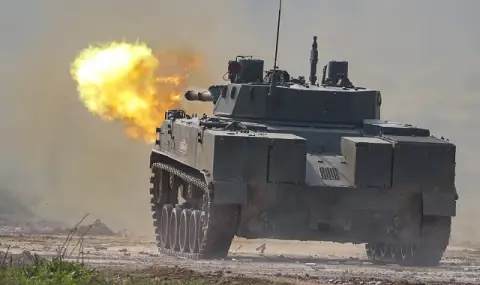Russia produces artillery shells three times faster than Ukraine's Western allies, for about a quarter of the price, Sky News reported.
The figures, produced by management consulting firm Bain & Company, highlight the major challenge facing Ukraine's armed forces as they rely on ammunition supplies from the United States and Europe to combat a full-scale Russian invasion.
The US, UK and other European allies have sought to increase production at their respective factories, but their ability to produce artillery shells still lags that of Russia despite a combined economic power that far exceeds that of Moscow. Ukrainian military forces need more shells to counter Russian attacks.
The study by Bain & Company, based on publicly available information, found that Russian factories are expected to produce or refurbish about 4.5 million artillery shells this year, compared with a combined production of about 1.3 million shells in European nations and the United States.
In terms of cost, the average production cost of a 155mm round - the type produced by NATO countries - is around $4,000 per unit, although it varies widely between countries. Russian production costs are about $1,000 for a 152 mm projectile, which the Russian armed forces use.
The shortage of artillery shells is only one of the problems facing the Ukrainian forces. The lack of supply means they just pretend to fire the weapon during training and would only use it for real when in combat, and then only when there are supplies.
The importance of arms and ammunition production is why many experts say factory production lines, not the front lines, may be where the war in Ukraine will be decided.
Sky News visited a factory in Belfast in April where the N-LAW missile is being assembled by Thales, a global defense company. The weapon was designed by the Swedish company Saab. Assembly takes place in a large hall containing a mix of machines, metal grinders and desks where delicate work is done on small but vital components. The working hours of the production line at that time were only four days a week from 7am to 4pm, although they were thought to be increasing.
Philip McBride, chief executive of Thales Belfast, said N-LAW's production capacity has doubled since the start of the year and has the potential to double again. Asked why the production expansion only started when Russia's full-scale war broke out in February 2022, he explained that it was due to a number of factors.
First, the UK MoD is supplying Ukraine with the N-LAW, not Thales directly. Initially, the missiles given to the Ukrainian army were those that the British armed forces already had in their own stocks. Another factor is that it can take up to two years to procure the parts needed for the N-LAW, he explained.
